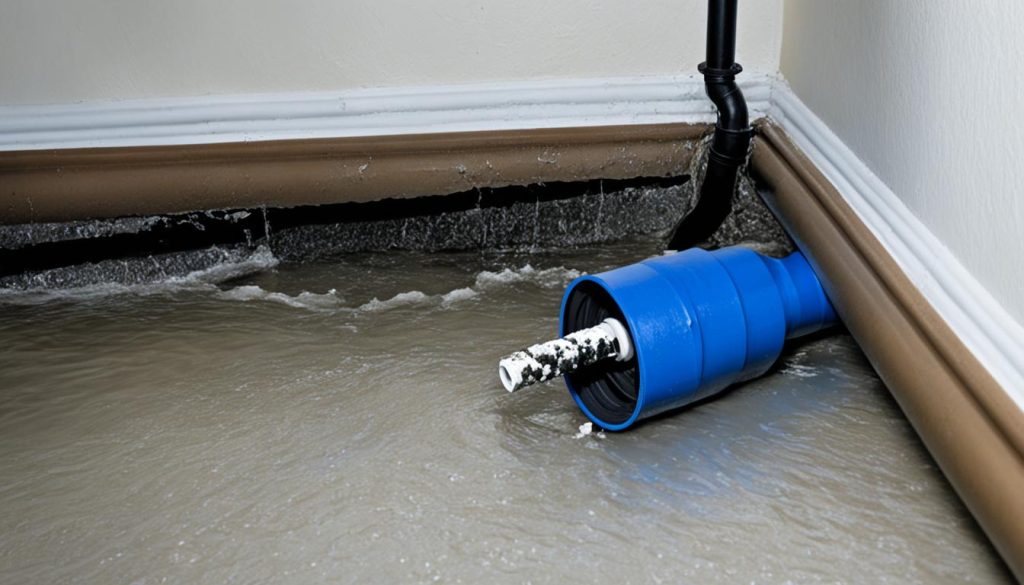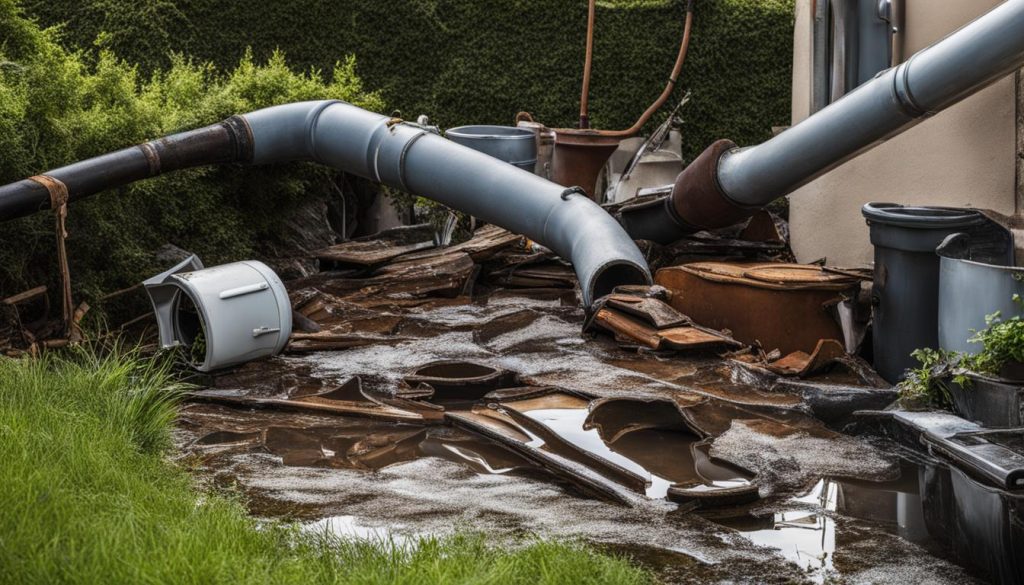Suing a Plumber for Negligence: A Guide
Did you know that plumbing-related issues account for approximately 14% of all homeowner insurance claims in Canada? When a plumber fails to provide reasonable care, the consequences can be costly and devastating. If you’ve experienced financial, property, or health damages due to a negligent plumber, you may have grounds to sue and seek compensation for your losses. In this guide, I will walk you through the steps involved in pursuing a plumber negligence lawsuit and help you understand the legal action you can take against a negligent plumber.
Key Takeaways:
- Suing a plumber for negligence can be a complex legal matter.
- Plumber negligence refers to a situation where a plumber fails to provide reasonable care and causes harm to the customer.
- You can sue a plumber if their actions directly caused clear financial, property, or health damages.
- To prove plumber negligence, you need to demonstrate that a duty of care was owed, breached, and resulted in damages.
- The negligence lawsuit process involves consulting with an attorney, filing the lawsuit, engaging in discovery, going to trial, and potentially collecting damages.
- Consider exploring alternatives, such as out-of-court settlements, before proceeding with a formal lawsuit.
What is Plumber Negligence?
Plumber negligence refers to a situation where a plumber fails to provide reasonable care while working on plumbing systems, resulting in harm to the customer. This can include improperly installing a water heater that causes property flooding or neglecting to identify the source of a slow pipe leak, leading to mold growth. Negligence occurs when the plumber fails to act as another qualified plumber would in the same situation.
Examples of Plumber Negligence
Plumber negligence can manifest in various ways, causing significant damage and inconvenience to homeowners. Here are some common examples:
- Improper installation: A plumber fails to follow proper installation procedures when fitting pipes, resulting in leaks, bursts, or water damage.
- Failure to detect issues: A plumber neglects to identify underlying plumbing problems during an inspection, leading to significant issues such as mold growth or sewage backups.
- Substandard repairs: A plumber performs repairs using subpar materials or methods, causing the problem to persist and potentially create additional damage.
- Incorrect diagnosis: A plumber misdiagnoses a plumbing issue and performs unnecessary repairs, leading to unnecessary expenses for the homeowner.
The Consequences of Plumber Negligence
Plumber negligence can have severe consequences for homeowners. In addition to property damage and financial loss, it can also result in health hazards such as mold-related illnesses or exposure to harmful substances.
Proving Plumber Negligence
To hold a plumber accountable for their negligence, it is essential to gather evidence that proves their failure to provide reasonable care. This may include:
- Photographs or videos of the damage caused by the plumber’s actions
- Expert opinions from other qualified plumbers supporting the claim of negligence
- Documentation of the plumber’s breach of contract or violation of industry standards
- Receipts or invoices detailing the services provided by the plumber
| Steps to Prove Plumber Negligence | Importance |
|---|---|
| Gather evidence of the plumber’s actions | Crucial to establish the plumber’s negligence |
| Obtain expert opinions | Strengthens the claim by providing professional assessments |
| Document the breach of contract | Shows a violation of the plumber’s duty of care |
| Keep records of financial losses | Demonstrates the damages caused by the plumber’s negligence |
When can you Sue a Plumber?
If you have experienced clear financial, property, or health damages caused by a plumber’s negligence, you may have grounds to sue them. To pursue legal action, you need to establish several key factors:
- The plumber breached their duty of care towards you.
- They charged for services they did not properly fix.
- They owed you a duty of reasonable care.
In some cases, a written contract may not be necessary to establish liability. However, solid evidence of substandard work, breached duty of care, and resulting damages is crucial for a successful lawsuit.
To determine if you have a valid case, consult with a legal professional specializing in negligence cases. They can assess the specifics of your situation and guide you through the process of holding the plumber accountable for their actions.
Examples of Clear Damages
When considering whether to sue a plumber, it is important to identify the specific financial, property, or health damages you have experienced. Here are some examples:
- Significant property damage due to a burst pipe or flooding caused by plumbing negligence.
- Health problems resulting from exposure to mold caused by an undetected pipe leak.
- Expenses incurred from repeated repairs or replacements due to shoddy plumbing work.
Remember, these are just examples, and each case is unique. Consult with a lawyer to determine the damages relevant to your situation.
| Breach of Duty | Breach of Contract |
|---|---|
| A plumber neglects to properly install a water heater, causing extensive property damage. | A plumber fails to honor their agreement to fix a leaky faucet, resulting in repeated repairs and expenses. |
| A plumber ignores signs of a potential plumbing issue, leading to a burst pipe and subsequent damage to the property. | A plumber fails to complete the agreed-upon plumbing repairs, breaching the contract and causing financial loss. |
By understanding the grounds for suing a plumber, the damages involved, and the necessary evidence, you can make informed decisions regarding legal action to protect your rights and seek fair compensation.
Proving Plumber Negligence
To successfully sue a plumber for negligence and receive compensation, it is important to definitively demonstrate three key elements. First, you need to show that the plumber owed you a duty of care, which is established through licensure and their agreement to provide services following industry standards. Second, you must prove that the plumber breached their duty by failing to meet appropriate standards, deviating from what another qualified plumber would have done. Lastly, you need to demonstrate clear financial, property, or personal injuries resulting from the plumber’s negligence.
Evidence of Duty of Care
In order to establish that the plumber owed you a duty of care, it is essential to provide evidence of their licensure and their commitment to follow industry standards. This can be done by obtaining copies of their license, verifying their qualifications, and gathering any documentation or contracts that outline their responsibilities to provide safe, reliable plumbing services.
Proving Breached Duty
To prove that the plumber breached their duty of care, you will need to demonstrate that their actions fell below the standard expected of a competent and skilled plumber in similar circumstances. This can be achieved by presenting expert testimony from another qualified plumber who can confirm that the defendant’s actions deviated from accepted practices and contributed to the damages or injuries you suffered.
Demonstrating Damages
Lastly, it is crucial to provide clear evidence of the financial, property, or personal injuries resulting from the plumber’s negligence. This can include photographs, medical reports, repair bills, or any other documentation that supports your claim for compensation. The more comprehensive and compelling your evidence is, the stronger your case will be.
By meticulously gathering and presenting evidence of duty of care, breached duty, and demonstrating damages, you can establish a strong case against a negligent plumber. Consulting with a skilled attorney who specializes in negligence cases will further enhance your chances of a successful outcome.
| Duty of Care | Breached Duty | Demonstrating Damages |
|---|---|---|
| Provide evidence of licensure and commitment to industry standards. | Show deviation from accepted practices through expert testimony. | Present comprehensive documentation of financial, property, or personal injuries. |
| Verify qualifications and obtain copies of the plumber’s license. | Consult with another qualified plumber to provide expert testimony. | Include photographs, medical reports, and repair bills as evidence. |
| Document any contracts that outline the plumber’s responsibilities. | Highlight how the defendant’s actions contributed to damages or injuries. | Ensure the evidence is comprehensive and compelling. |
The Negligence Lawsuit Process
The process of filing a negligence lawsuit against a plumber involves several key steps. It begins with consulting with a civil litigation attorney who specializes in negligence cases. They will guide you through the process of filing the lawsuit, which includes drafting a written complaint outlining the allegations.
Discovery follows, which involves requesting documentation, posing interrogatories, and conducting depositions to gather evidence. This step is crucial in building a strong case by uncovering relevant information and establishing the plumber’s negligence.
If the case doesn’t settle during the discovery phase, it proceeds to trial. At trial, both sides present their arguments and evidence in front of a judge or jury. The goal is to convince the court that the plumber’s negligence caused harm and that you deserve compensation for your losses.
After receiving a judgment, there are additional steps that may need to be taken. These steps can include calculating the damages you are owed and pursuing the collection of those damages from the responsible party.
The negligence lawsuit process can be complex and overwhelming, which is why it is essential to have an experienced attorney by your side. They will navigate the legal system on your behalf, fight for your rights, and help you seek the compensation you deserve.
An Alternative
When facing a potential legal dispute with a plumber, it’s important to consider an alternative path before jumping straight into a lawsuit. Many conflicts between customers and plumbers can be resolved through an out-of-court settlement, which allows both parties to reach a mutual agreement and avoid the complexities and costs of a formal legal battle.
By engaging in productive negotiations and open communication, a solution that satisfies the needs of both the customer and the plumber can often be found. This approach not only saves time and money but also promotes a more amicable resolution, preserving relationships and avoiding unnecessary conflicts.
Before making any decisions, it’s advisable to consult with a qualified attorney who specializes in plumbing disputes. They can provide valuable guidance and advice, helping you explore all available options to determine the best course of action for your specific situation.
- Investing Wisely: How Windows & Doors in Boost Property Value and Financial Health - April 24, 2025
- The Financial Impact of Personal Injuries: Why Legal Help Matters for Business Owners - April 16, 2025
- The Hidden Financial Costs of Domestic Assault: What Business Owners Need to Know - April 16, 2025













